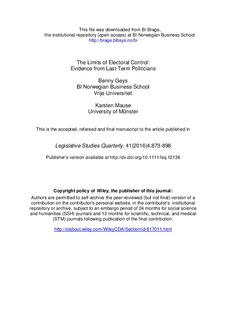| dc.contributor.author | Geys, Benny | |
| dc.contributor.author | Mause, Karsten | |
| dc.date.accessioned | 2015-12-11T10:00:44Z | |
| dc.date.accessioned | 2016-12-07T13:38:54Z | |
| dc.date.available | 2015-12-11T10:00:44Z | |
| dc.date.available | 2016-12-07T13:38:54Z | |
| dc.date.issued | 2016 | |
| dc.identifier.citation | Legislative Studies Quarterly, 41(2016)4:873-898 | nb_NO |
| dc.identifier.issn | 1939-9162 | |
| dc.identifier.issn | 0362-9805 | |
| dc.identifier.uri | http://hdl.handle.net/11250/2424541 | |
| dc.description | This is the accepted, refereed and final manuscript to the article | nb_NO |
| dc.description.abstract | In modern democracies, politicians’ accountability is often linked to the disciplining mechanism of electoral control. For politicians in their final term, this mechanism is impaired. Using a novel dataset covering 910 members of the UK House of Commons active within the period 1997-2010, we investigate how reduced electoral control affects last-term MPs’ trade-off between work effort inside parliament, leisure, and outside interests. Our main contributions lie in providing the first explicit consideration of (a) MPs’ final-term intra-/extra-parliamentary work balance, and (b) MPs’ reasons for leaving parliament (i.e. retirement, career change, electoral defeat). These extensions provide important fresh insights concerning the boundaries of elections’ disciplining power. | nb_NO |
| dc.language.iso | eng | nb_NO |
| dc.publisher | Wiley | nb_NO |
| dc.title | The Limits of Electoral Control: Evidence from Last-Term Politicians | nb_NO |
| dc.type | Journal article | nb_NO |
| dc.type | Peer reviewed | nb_NO |
| dc.date.updated | 2015-12-11T10:00:44Z | |
| dc.source.journal | Legislative Studies Quarterly | nb_NO |
| dc.identifier.doi | http://dx.doi.org/10.1111/lsq.12136 | |
| dc.identifier.cristin | 1297559 | |
| dc.description.localcode | 2, Forfatterversjon | nb_NO |
